- “We’re not guilty,” Abdullah Saud Al-Thani told CNBC in an exclusive interview Sunday
- Saudi Arabia, the United Arab Emirates, Egypt, and Bahrain are leading a boycott against Qatar
- Abdullah Saud Al-Thani told CNBC that while the bank has noticed money outflows from some non-residents, the size of them wasn’t particularly significant
CNBC.com
The governor of Qatar’s central bank believes the country’s economy will be able to fully withstand any financial shocks brought on by the dispute in the Gulf, and welcomed outsiders to investigate its accounts and money flows.
“We’re not guilty,” Abdullah Saud Al-Thani told CNBC in an exclusive interview Sunday. The central banker referred to the accusations placed by other Arab nations that accuse Qatar of supporting terrorism.
“We have no challenges, we welcome those to review all our books, they are open,” he added.
Qatar still finds itself excluded and singled out by its near neighbors. Saudi Arabia, the United Arab Emirates, Egypt, and Bahrain are leading a boycott against Qatar, and since last month have severed diplomatic and transport ties.
Doha denies charges that it supports terrorism, and denies that it has allied itself with regional foe Iran. Qatar is now seeking compensation for damages from the blockade. On Thursday evening, the four Arab nations released a joint statement pledging new political, economic and legal steps against Qatar, according to Reuters.
Still, the country’s central banker dismissed the allegations that have beset the country.
“Qatar has already had a good and unique system. We have laws established against all these kinds of terrorists ,” Al Thani told CNBC. “We work with the IMF (International Monetary Fund) and other institutions to establish our laws and audits and reviews.”
Qatari stock markets have sunk lower on the boycott and the country’s currency—the riyal—has seen wild fluctuations, while credit ratings agencies have warned on a period of uncertainty for the nation.
However, Al-Thani told CNBC that while the bank has noticed money outflows from some non-residents, the size of them wasn’t particularly significant.
“There is more [money] coming in,” he said, confirming that inflows are exceeding the outflows.
Speaking at the bank’s headquarters in Doha, he said that the Qatar Central Bank had $40 billion in cash reserves plus gold. In addition, the Qatar Investment Authority has $300 billion in reserves that it could liquidate, he said. He also spoke of long-term contracts in the gas and oil sectors that were not seeing any disruptions.
“This is the credibility of our system, we have enough cash to preserve any – any kind of shock,” he said.
“So we don’t believe that there is anything to worry about at this moment. What I can say is that our environment is proof to anybody that we are first of all solid, strong and resilient against any kind of shocks,” he added.






























